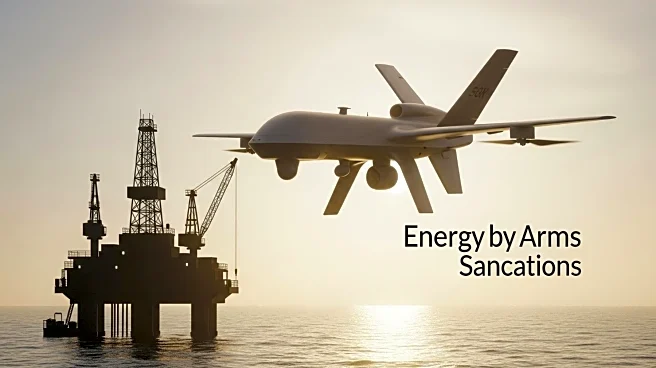What's Happening?
Russia and Vietnam have devised a method to bypass US and Western sanctions on arms deals by using profits from joint oil and gas ventures. According to internal Vietnamese documents, Vietnam purchases Russian military equipment on credit and repays this credit using profits from a joint Vietnam-Russia oil company in Siberia. This arrangement allows for the continuation of military transactions without direct cash transfers through the global banking system, which could be subject to sanctions. The revelation comes as the US seeks to strengthen ties with Vietnam amid growing Chinese assertiveness in Southeast Asia. The Trump administration has imposed tariffs on Vietnam and is considering further sanctions on Russia. The European Union has also increased sanctions on Russia to pressure President Vladimir Putin to end the war in Ukraine.
Why It's Important?
This arrangement highlights the complexities of international sanctions and the lengths countries may go to circumvent them. For the US, this poses a challenge in maintaining effective sanctions against Russia while fostering strategic relations with Vietnam. The use of energy profits to fund military purchases could undermine US efforts to isolate Russia economically and militarily. Vietnam's strategic importance in countering China's influence in Southeast Asia makes it a critical partner for the US, complicating the decision to impose sanctions. The situation underscores the geopolitical balancing act faced by the US in managing relations with countries involved in Russian arms deals.
What's Next?
The US may need to reassess its approach to sanctions and diplomatic relations with Vietnam, considering the strategic importance of Vietnam in the Indo-Pacific region. Further sanctions on Russia or countries engaging in arms deals with Russia could be considered, but this risks alienating Vietnam. The Trump administration's transactional approach may lead to more stringent measures, potentially affecting Vietnam's military capabilities and its relationship with the US. The evolving geopolitical landscape will require careful navigation to balance sanctions enforcement with strategic partnerships.
Beyond the Headlines
The use of energy profits for military purchases raises ethical and legal questions about the effectiveness and enforcement of international sanctions. It also highlights the potential for countries to exploit loopholes in global financial systems to achieve strategic objectives. The arrangement may prompt discussions on the need for more robust international financial oversight and cooperation to prevent such circumventions. Additionally, Vietnam's growing military capabilities could shift regional power dynamics, influencing future diplomatic and military strategies in Southeast Asia.









